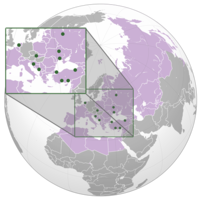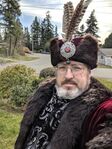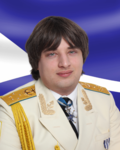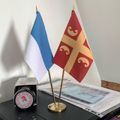Empire of Pavlov
This article or section documents a current event. Information may change rapidly as the event progresses. |
Empire of Pavlov Павлівська Імперія Pavlivs'ka Imperijaa Павлівська Басіьлєъўство Pavlivs'ka Basi'leŭwstvo | |
|---|---|
| Motto: Басіьлєъўсь Басіьлєїв Басіьлєствующий над Басіьлєями (Imperial) King of Kings, reigning over those who rule P.E.I.O.U.P (civil) Pavloviae est imperare orbi universo planae It is Pavlov's destiny to rule the whole flat world Welcome to Heaven on Flat Earth (tourism slogan) | |
 Location of territories under Pavlovian administration Claimed spheres of influence in purple | |
| Capital | Alexandropol |
| Official languages | Ukrainian, Pavlovian English |
| Recognised national languages | Slovak, Dutch, Russian |
| Religion | Nicene Christianity |
| Demonym(s) | Pavlovian Rus' (official) Roman (popular) Pavlovian (common) |
| Government | Autocratic republican monarchy |
• Monarch | HIM Emperor Ivan VII |
• Consuls | TBD |
| Legislature | Senate |
| Independence | |
• Declared | 8 July 2012 |
| Area | |
• Total | 0.74 km2 (0.29 sq mi)b |
| Population | |
• 2021 census | 81 |
| Currency | Hryvnia (de jure) Euro (de facto) |
| Time zone | UTC+1 (Central European Time) |
• Summer (DST) | UTC+2 (Central European Summer Time) |
| Date format | dd-mm-yyyy (AM) |
| Driving side | right |
| Calling code | +7 (proposed) |
| Internet TLD | .pl |
| |
The Empire of Pavlov (Ukrainian: Павлівська Імперія), is a micronation with enclaves in the the Netherlands, Slovakia, Ukraine, Turkey, Serbia, Russia, the Czech Republic, Brazil, and Antarctica. It was founded in 2012 by Dionisiy Bekbulatov. The Empire of Pavlov has claimed itself a nation but it is not recognized as a country by the United Nations or any major government. It operates under the autocratic constitutional monarchy of its Emperor, Ivan VII Aleksandrovytch.
Pavlov considers itself the continuation of the Kyivan Rus' and the Eastern Roman Empire. After Pavlov's registration as an NGO, the official mission statement of Pavlov was decided as "[..]to defend and promote the cultural heritage of Rus’ and of the Roman Empire through creating an ecosystem where their society, customs and traditions are modeled in a contemporary framing". In this context most aspects of the political, civil and religious discourse are under direct Rus' or Eastern Roman inspiration.
Etymology
The etymology of the name "Pavlov" has been a debate amongst Pavlovians of all eras. The two most popular theories of its origin are that the country is named either in honor of the Russian physiologist Ivan Pavlov or in honor of the Apostle Paul (the Patron saint of the "Kingdom of Pavlov"). For both, the same would transcend into Pavlov, as Pavlov means in Russian "belonging to Paul/Pavel". According to later Pavlovians, however, the Ukrainian name of the state, which is official, clearly testifies in favor of the second, now generally accepted theory. As the name of the Empire is "Павлівська" (vs "Павловська"), it is possible only from the name "Pavlo" and not from the surname "Pavlov".
History
University
The origins of Pavlov come from a micronation teenhood project, called The Kingdom of Pavlov, founded by Bekbulatov and Tom Prins on July 8, 2012, as an experiment of how an absolute monarchy would function in the 21st century claiming a piece of Antarctica. As membership in the government grew over the course of late 2012, Pavlov experimented with other types of government, including a short period as a republic, before finally becoming a constitutional monarchy in December. In March 2013, friendly diplomatic ties between Pavlov and the Russian micronation Lostisland grew following the election of His Majesty Alexander IV as one of the Captain Regent of the Republic of Lostisland while the other Captain Regent, Yaroslav Mar, was elected Prime Minister of Pavlov.
Merger with Lostisland
As the leadership of both Pavlov and Lostisland was involved heavily in the other internal affairs, a merger was proposed and discussed by both countries. Following successful referenda, in which both Pavlov and Lostisland voted to merge, a treaty of unification was signed between the leaders of the two countries. On 19 April 2013, the Federal Republic of Lostisland was established and former Lostislandic Yaroslav Mar was selected to serve as Federal President while His Imperial Majesty Alexander IV was selected to serve as Prime Minister. Pavlov was integrated within the new union as the Federation of Pavlov. Although the initial month was relatively stable, tensions between the federal government and the Federation of Pavlov began following a series of pro-separatist civil unrest led by the Alexander IV's cousin, a prominent Pavlovian nobleman.[1] Following the end of the unrest, Alexander IV's cousin was exiled. The exile of his cousin eventually led to Alexander IV stepping down as Prime Minister of Lostisland[2] and unilaterally declaring the independence of the Republic of Pavlov. Following the proclamation of the Republic of Pavlov, the conflict expanded to an international level.
In an effort to end the crisis, Federal loyalists and forces loyal to the Republic of Pavlov began negotiating a solution to the conflict. The negotiations eventually ended with the dissolution of the Republic of Pavlov and the re-integration of the Federation of Pavlov (later renamed to Belastrova) within the Federal Republic of Lostisland.
Golden age
On 14 September, Bekbulatov was allowed by the Antarctic Micronational Union to assert sovereignty over the Antarctic claims of the former Grand Principality of Snežanopol and established the Grand Principality of Pavlov. The new Pavlovian state was recognized by the Federal Republic of Lostisland,[3] mere minutes after its proclamation. In 2014 Pavlov was reformed into an Empire,[4] joined the AMU,[5] and adopted a predominantly Russian culture.In 2015 Pavlov focused on organizing Russophone summits in Moscow under the leadership of Yaroslav Mar (HIH Tsesarevych Jaroslav), during this period Pavlov was well known for her social conservative policies.[6] In late 2015, the Emperor commissioned a new anthem to be composed by a famous Russian composer[7] and the development of a new, innovative eGovernment portal.[8]
Downfall and revivals
In June 2016, the Emperor and Autocrat Alexander IV ratified a new Constitution for the empire.[9] The treaty with Lostisland was voided after tensions rise between Yaroslav Mar and Bekbulatov due to this new constitution. In late 2016, Pavlov rapidly expanded following the peaceful annexations of Hasanistan,[10] Carpathia,[11] Akebar,[12] and other regions. On 12 October, a new government was appointed by the Emperor, led by Kristof Fondrk. On 3 December a plot planned by Pavle Savovic was uncovered which would have turned Pavlov into a "Pavlist" dictatorship.[13] Pavlov was disestablished soon after the plot was uncovered. Numerous attempts to revival were taking place in this era (2017-2018) under the leadership of Kristof Fondrk, Christian Newton and Hasan Çakar, all of them equally unsuccessful and getting no further than reconnecting a group of friends.
Montescano
Montescano was founded in May 2019 to re-enter micronational politics, during this period many old friendships were revived and some were destroyed. Since the earliest foundation of Montescano calls were made by citizens at reviving the Empire and re-asserting the Imperial claim. Montescano was known for an extensive online legislature, unlike the more autocratic Pavlovian projects. During Montescano, the Pavlovian Union was briefly founded to maintain the Pavlovian legacy but ultimately was unsuccessful to maintain the former Pavlovian micronations in partnership. Nedland briefly joined Montescano in June 2019, however upon the decision to start a census, Nedland declared their wish for secession from the Principality, due to the great number of inactive subjects who would otherwise have been removed from the subjectship roster.
Great Reset
Upon final agreement of Bekbulatov, Mar and Fondrk and numerous other former Pavlovians, Pavlov was refounded on 12 June 2020. The Imperial claim was re-asserted and the name of the state once more became the Empire of Pavlov - which it had been for over 1492 days. During this era, those in power between 2016-2019, became less politically active, and at the end of 2020, Pavlov had her first female Head of Government since foundation in 2012. On Christmas-eve 2020, the Monarch announced the registration of Pavlov as an NGO. A subjectship census took place in January 2021, ousting nearly 200 inactive Pavlovian subjects from their subjectship. Emergency passport were issued to the immediate members of the Imperial family. The Monarch received tacit recognition from the Holy See and Monaco.
Eras
Pavlov as a community has had several incarnations, with the modern Empire of Pavlov being the last of them.
| Era | Full Organization Name | Length of Era | Notes | Leaders | ||
|---|---|---|---|---|---|---|
| University | 8 July 2012 - 19 April 2013 | Kingdom of Pavlov | 285 days | The Kingdom of Pavlov was founded on 8 July 2012 as a new nation project experimenting with absolute monarchy. As membership in the government grew over the course of late 2012, Pavlov experimented with other types of government, including a short period as a republic, before finally becoming a constitutional monarchy in December. | Dionisiy Bekbulatov, Tom Prins, Viktor Rusch | |
| Lostislandic | 19 April 2013 - 10 May 2013 | Federation of Pavlov | 21 days | On 19 April 2013, the Federal Republic of Lostisland was established and former Lostislandic Yaroslav Mar was selected to serve as Federal President while Bekbulatov was selected to serve as Prime Minister. Pavlov was integrated within the new union as the Federation of Pavlov. | Yaroslav Mar, Dionisiy Bekbulatov | |
| Pavlov not existing (553 days) | ||||||
| Start-up | 14 September 2014 - 30 September 2014 | Grand Principality of Pavlov | 16 days | On 14 September, the Bekbulatov was allowed by the Antarctic Micronational Union to assert sovereignty over the Antarctic claims of the former Grand Principality of Snežanopol and established the Grand Principality of Pavlov. | Dionisiy Bekbulatov, Yaroslav Mar | |
| Golden | 30 September 2014 - 21 June 2016 | Empire of Pavlov | 630 days | It was in this era that the idea of Pavlov being the fourth Rome and legal successor to Kyivan Rus' were enacted and started. During this period, the Empire co-hosted numerous summits in Moscow, with members of the Russophone community such as the Federal Republic of Lostisland, the Soviet Socialist Republic of Nadiria, the Republic of Eslande and the Kingdom of Nazir represented. During 2015, the Empire followed an isolationist foreign policy and mostly concentrated on internal development. In late 2015, the Emperor and Autocrat commissioned a new anthem to be composed by a famous Russian composer and the development of a new, innovative eGovernment portal. | Dionisiy Bekbulatov, Jaroslaw Andriewsky, Yaroslav Mar | |
| Downfall | 21 June 2016 - 4 February 2017 | 228 days | In June 2016, the Emperor and Autocrat Alexander IV ratified a new Constitution for the empire. The treaty with Lostisland was voided after tensions rise between Yaroslav Mar and Bekbulatov. In late 2016, Pavlov rapidly expanded following the peaceful annexations of Hasanistan, Carpathia, Akebar and other regions. On 12 October, a new government was appointed by the Emperor, led by Krishtof von Drakon. On 3 December a plot planned by Pavle Savovic was uncovered which would have turned Pavlov into a "Pavlist" dictatorship. | Dionisiy Bekbulatov, Kristof Fondrk | ||
| Revivals | 4 February 2017 - 31 October 2018 | 634 days | Pavlov was disestablished soon after the plot was uncovered. Numerous attempts to revival were taking place in this era, all of them equally unsuccessful. | Dionisiy Bekbulatov, Kristof Fondrk, Christian Newton | ||
| Pavlov not existing (210 days) | ||||||
| Montescano | 29 May 2019 - 12 June 2020 | Principality of Montescano | 380 days | Montescano was founded in May 2019 to re-enter micronational politics, during this period many old friendships were revived and some were destroyed. Since the earliest foundation of Montescano calls were made by citizens at reviving the Empire and re-asserting the Imperial claim. Montescano was known for a extensive online legislature, unlike the more autocratic Pavlovian projects. | Dionisiy Bekbulatov, Kristof Fondrk | |
| Great Reset | 12 June 2020 - 17 February 2022 | Empire of Pavlov | 615 days | The Imperial claim was re-asserted and the name of the state became the Empire of Pavlov which it had been for over 1492 days. During this era, those in power between 2016-2019, became less politically active, in the end of 2020 Pavlov had her first female Head of Government since foundation in 2012. On Christmas-eve 2020, the Monarch announced the registration of Pavlov as an NGO. 2021 marked the first ever double female Head of Government era the Empire had. Emergency passport were issued to the immediate members of the Imperial family. The Monarch received tacit recognition from the Holy See and Monaco. Experienced micronationalists HS Duke Erik Haroldovych White and The Well Born Baron Kristiian Karolovych Nevtonenko were appointed as co-Heads of Government. | Dionisiy Bekbulatov, Yaroslav Mar, Helena Aleksandrivna Kirsanova, HS Duke Erik Haroldovych White, The Well Born Baron Kristiian Karolovych Nevtonenko | |
| Current | 17 February 2022 - Present | 2 years, 9 months, 6 days | Emperor Alexander IV abdicates on 17 February 2022. HS Duke Erik Haroldovych White ascends to the throne being the first in line and takes the regnal name Ivan VII, continuing the numeration of Russian emperors according to the Pavlovian tradition. | Ivan VII, Helena Aleksandrivna Kirsanova, Yaroslav Mar, Constantine Kejb | ||
Rus' and Byzantine heritage
Pavlov claims to be the legitimate successor of the Kievan Rus since 2014,[14] this can be seen from the adoption of Russkaya Pravda as civil code, the title of "Autocrat of all Rus'", the names of administrative divisions, the name of the Monarch, Alexander IV, being styled in a way of continuing the numeration of the Rus' Monarchs and many similar quirks.
The Pavlovian ruler assumed the title of Emperor (Pavlovian: Басіьлєъўсь) and Autokrator (Pavlovian: Аъвтократор)[15] to emphasize his claim to the Roman and Byzantine Imperial legacy. In a way similar to how Muscovy adopted Byzantine terms, rituals, titles and emblems such as the double-headed eagle in 1472 after Ivan III married Sophia Palaiologina. The Pavlovians claim that since the Pavlovian Monarch remained the only legitimate ruler who can claim lineage from both the Third Romes (both Moscow and Istanbul), and that Pavlov was the Fourth Rome, becoming the final lineal successor to Rome, Constantinople and Rus, the three centers of Christianity and of the Roman Empires of earlier periods. The "Fourth Rome" concept would resonate in the self-image of the Pavlovian people in future years, with HIH Tsesarevych Jaroslav proclaiming "Three Romes have fallen. The Fourth Rome still lives in our souls[..]"[16]
Alexander IV citing his claim on the title of Emperor to his connection to the three imperial bloodlines. As in Ottoman times it was already a well considered fact that "if Rome and Byzantium represented two of the three international traditions of imperial legitimacy, the blood of Genghis Khan was the third".[17] The Pavlovians consider Bekbulatov the legitimate 183rd Roman Emperor,[18] his claim to the title was recognized by the Emperor-King of Karnia-Ruthenia in the Treaty of Dionysopol, in the subsequent Treaty of Theodosia also by HIM Emperor Wilhelm I.
Territory
Pavlov is regarded by the founder as a socio-cultural project, as was incorporated as a Dutch non-governmental organization to achieve this goal. The land plots claimed as "sovereign territory" by Pavlov in the the Netherlands, Slovakia, Ukraine, Turkey, Russia, and Antarctica are ceremonial claims and part of Pavlov's "cultural heritage". Pavlov has sent letters to the Governments in which they claim land, informing them of the ceremonialness of the claims and that they do not dispute the territorial integrity of the countries they claim land in. Pavlov considers herself a sovereign subject of international law around the "Imperial throne".[19] On New Year's Eve the Pavlovian Senate passed an Act declaring the territory within a 1 km radius around the Monarch, his consort and the Heir to the Throne Pavlovian sovereign territory.
Administrative divisions
Pavlov comprises of twenty five pieces of land. The largest piece of Pavlovian land, Laranda lies in Turkey, the smallest piece Theodosia in the Netherlands. Pavlov is divided into Praetorian Prefectures and Zemlji the first level administrative division in the Empire. Praetorian Prefectures and Zemlji are further subdivided into Themes, the second level and main administrative division. Themes rougly encompas old Roman Provinces or Byzantine Themes. Themes consist of Banda and Uyezds the third level administrative division of the Empire. Banda and Uyezds are further subdivided into Cities, Towns and Manors. Cities are the only administrative division not under the leadership of a hereditary noble, but instead by an Urban prefect.
| Arms | Picture | Name | Population | Noble |
|---|---|---|---|---|

|
N/A | Theme of Bohemia | 1 | Duke HS Duke Jakub Ladislavevych Malyj |

|
N/A | Theme of Britannia | 1 | Duke HS Duke Filaret Prokhorovych Zakharov |

|
Theme of Germania | 13 | Duke HS Duke Fedir Ivanovych Pivnichnyj | |

|

|
Theme of Moesia | 1 | Duke HS Duke Mykolaj Sladzhanovych Moesiskyj |

|

|
Theme of Mundus novus | 1 | Duke HM Despot Lyudovyk I |

|

|
Theme of Pannonia | 5 | Duchess HS Duchess Helena Aleksandrivna Kirsanova |

|

|
Theme of the Cibyrrhaeot | 7 | Duke HS Duke Filaret Prokhorovych Zakharov |

|
N/A | Theme of Cyprus | 1 | Duke HS Duke Emil' Pavlovych Hardyj |

|
N/A | Theme of Opsikion | 7 | Duke HS Duke Modest Ahmetovych Saradzhev |

|

|
Theme of Thrace | 2 | Duke HIH Duke Alexander Bekbulatov |

|

|
Theme of Volodymyr-Suzdal | 6 | Duke HIH Duke Alexander Bekbulatov |
Governance & administration
Pavlov is an autocratic constitutional monarchy, under the rule of the Emperor, Ivan VII . The Monarchy is mainly based on the office of Grand Prince of Kyiv and that of Emperor of the Roman "Byzantine" Empire under the Komnenos dynasty, the Angelos dynasty. It also bears some heritage from the Office of Great Khan of the Mongol Empire. As such the position is not hereditary in direct-male line, but the Senate upon the nomination of the Monarch picks the Heir apparent from the Imperial Family and adopted children of the Monarch.
The first-level administrative division in Pavlov is the Zemlja, based on the administrative divisions of Kievan Rus’. Zemlji are composed by the main and second-level subdivision, the Uyezd, an Uyezd is intended to encompass any Pavlovian territories, whether contiguous or not, resting within the same couple of square kilometer of land and water. Uyezds are further composed of Towns, and Manors. Zemlji are led by Princes, Uyezds by Counts and Towns and Manors by Barons.
Consuls
The two Consuls acts as Head of Government of the Empire of Pavlov. While the Empire is an autocracy in many ways, the Basic law of the Empire was written so that many of the Monarchs prerogatives can be used at will of the Consuls. The Consuls and Senate are two distinctive Roman governmental features Pavlov has. Unlike in many contemporary constitutional monarchies, the Monarch is not banned from serving as Head of Government in Pavlov. The term of a Consul is one year. List of Consuls:
- 2020: HS Duchess Helena Aleksandrivna Kirsanova (Ducissa Helena Alexandra filia Kirsanova) and HM Despot Ivan Brienskyj (Dominus Iohannes Gavrijil filius Brienorum Rex)
- 2021: HIM Empress Mariia (Mariia Georgia filia Augusta) and HS Duchess Helena Aleksandrivna Kirsanova (Ducissa Helena Alexandra filia Kirsanova)
- 7530: HIH Grand Prince Erik Aleksandrovych (Euricus Nobilissimus Caesar) and HS Duke Kristiian Karolovych Nevtonenko (Dux Christianus Karolus filius Nevtonenko)
- 7530: HS Duchess Helena Aleksandrivna Kirsanova (Ducissa Helena Alexandra filia Kirsanova)
Government
Pavlov doesn't have a specific number of available ministerial portfolios, in accordance with its principle to "find positions for people, not people for positions". In practice, this means that when a citizen knowledgeable in a particular field joins Pavlov, a ministerial position may be created especially for him, and disestablished if they resign or get dismissed. According to the Basic law of the Empire, the only fixed positions are those of the Consuls.
As of 2020, the following ministries exist:
- Bureau of the Barbarians, responsible for coordination between Pavlov and foreign countries and organizations, responsible for subjectship applications.
- Secretariate of Minorities, responsible for the protection of minorities.
In addition, Pavlov has one independent agency which is part of the executive but not part of the Cabinet:
- Oprichnina, responsible for the protection of law and order, for foreign intelligence, security and investigations
-
HS Duchess Helena Aleksandrivna Kirsanova:
First Consul and Secretary of Minorities
Senator -
HI Count Jaroslav Mykhaylovych Andrijewskyj:
Pontifex Maximus
Senator -
HS Duke Modest Akhmetovych Saradzhev-Opsikionskyj:
Secretary of the Barbarians
Senator -
The Well Born Baron Fyodor Borysovych Saradzhev:
Head of the Oprichnina
Senator
Foreign Relations
Pavlov has a fairly isolationist foreign policy, which is furthermore limited by the Orientism political theory and the Treaty of Theodosia. Pavlov does not enter alliances with other micronations in general, the only exception to this is the Federal Republic of Lostisland, signed in light of the strong cultural and historical ties between the two nations. Pavlov is a member of the Antarctic Micronational Union and one of the original signatories of its 2020 Charter; an original signatory of the Montediszamble Convention and an observer member of the Union of Micronations of Central Europe.
Recognized nations
Nations which are Socii states of Pavlov
 Grand Duchy of Rascia, 25 September 2020
Grand Duchy of Rascia, 25 September 2020 Kingdom of Nichensburg, 30 August 2021 (Also in Personal Union)
Kingdom of Nichensburg, 30 August 2021 (Also in Personal Union) Most Serene Republic of Richensland, 17 December 2021
Most Serene Republic of Richensland, 17 December 2021
Nations which are in a state of alliance with Pavlov
 Federal Republic of Lostisland, since 20 January 2020
Federal Republic of Lostisland, since 20 January 2020
Nations with which Pavlov has signed a treaty of mutual recognition or exchanged acts of recognition
The following list does not include defunct nations, nations with which a treaty was terminated, nor nations with which a treaty was signed for a finite period of time and not renewed upon expiration.
 Angle-Saxish Kingdom, since 21 December 2020
Angle-Saxish Kingdom, since 21 December 2020 Republic of Ashukovo, since 23 April 2020
Republic of Ashukovo, since 23 April 2020 Empire of Austenasia, since 3 January 2020
Empire of Austenasia, since 3 January 2020 Gymnasium State, since 25 June 2019
Gymnasium State, since 25 June 2019 Karnia-Ruthenia, since 1 August 2019
Karnia-Ruthenia, since 1 August 2019 Grand Duchy of Klitzibürg, since 12 June 2020
Grand Duchy of Klitzibürg, since 12 June 2020 Confederation of Mahuset, since 5 June 2019
Confederation of Mahuset, since 5 June 2019 United States of Mekniy, since 13 August 2020
United States of Mekniy, since 13 August 2020 Nedlando-Khorașanese Union of Former Colonial Possessions, since 3 July 2019
Nedlando-Khorașanese Union of Former Colonial Possessions, since 3 July 2019 Principality of New Lubenia, since 22 July 2020
Principality of New Lubenia, since 22 July 2020 North American Confederation, since 12 June 2020
North American Confederation, since 12 June 2020 State of Zenrax, since 3 July 2019
State of Zenrax, since 3 July 2019
Nations which are in a state of mutual recognition with Pavlov by virtue of membership in the Antarctic Micronational Union
 All member states of the Antarctic Micronational Union, since 4 April 2013
All member states of the Antarctic Micronational Union, since 4 April 2013
Nations which are unilaterally recognized by Pavlov
Tacit recognition
Pavlov claims to have received tacit recognition - that is, acts or conduct which, in the absence of any indication to the contrary, can be reasonably interpreted to imply recognition - from several countries which have not explicitly granted the Empire official diplomatic recognition.
 Monaco: On 29 December 2020, a letter from the Office of HSH the Sovereign Prince addressed the Emperor as "Augustus" and referred to him as the "Leader of Pavlov" implying recognition of Pavlov's monarchy, her Imperial status and government.[note 1]
Monaco: On 29 December 2020, a letter from the Office of HSH the Sovereign Prince addressed the Emperor as "Augustus" and referred to him as the "Leader of Pavlov" implying recognition of Pavlov's monarchy, her Imperial status and government.[note 1] Holy See: On 16 January 2021, a letter from the Office of Apostolic Nuncio to the Kingdom of the Netherlands addressed the Emperor as "Augustus" implying recognition of Pavlov's monarchy and her Imperial status.[note 2]
Holy See: On 16 January 2021, a letter from the Office of Apostolic Nuncio to the Kingdom of the Netherlands addressed the Emperor as "Augustus" implying recognition of Pavlov's monarchy and her Imperial status.[note 2]
Economy
The Empire has a tiny market economy. Currently, the only two company operating in Pavlov is the Pavlovian Export-Import Bank and the Imperial Post (both for 66% owned by the Emperor). The currency of Pavlov is the Hryvnia. Pavlov is completely reliant on imported goods and services provided by bordering countries. The only two active sectors in Pavlov are the IT sector and the Agricultural sector. Since recently an e-banking solution has been released for the Pavlovian Hryvnia. There are plans being made to start developing wine and the generation of solar energy.
The IT sector is mostly based in the Themes of Germania and Kyiv, while Agricultural sector is mostly based in the Anatolics (cherries), Chaldia (tea and olives) and Moesia (cherries, peaches, grapes, plums and wheat). 95% of the produce of this get's sold to Turkey (Anatolics and Chaldia) and Serbia (Moesia) respectively.
Demographics
Pavlov has a total population of eighty one. Fifty four of these are residents living on the territory of Pavlov, the remaining twenty seven have been given subjectship by naturalization through Imperial decree and do not physically reside on the territory of Pavlov. Citizens of Lostisland and Brienia may apply through a simplified procedure. Prospective subjects are screened by the Secretary of the Barbarians and the Imperial Oprichnina. The non-residential subjects of Pavlov have no automatic political rights and as such is seen as a honorary association with the country. Pavlov has six "Roman citizens", the Roman citizenship opens full political rights to her recipients. This level of citizenship was established in order to cover the costs associated with running an NGO.
Population
As of September 2020, Pavlov has a population of 81 subjects hailing from Europe, North America and Asia. The largest Pavlovian diasporas are found in the Turkey, Netherlands and Ukraine.
| Country | No. of subjects |
|---|---|
| 24 | |
| 14 | |
| 10 | |
| 7 | |
| 18 | |
| 4 | |
| 3 | |
| 3 | |
| 2 | |
| 2 | |
| 2 | |
| 1 | |
| 1 | |
| 1 |
Languages
English is the lingua franca in Pavlov and spoken by at least 80% of the 81 subjects. Ukrainian the second official language, is spoken by a minority of subjects concentrated in the Themes of Klimata, Kyiv and Germania. While there is a large minority of Russian speakers, the usage of the language is officially banned in Pavlov. Other minority languages include Dutch, Serbian, Turkish and Slovakian.
Culture
Pavlovian culture is largely influenced by the Ukrainian, Greek and Western-Turkish Culture. Most of the "citizens" of Pavlov practice a serious form of Chalcedonian Christianity in various denominations (60%). There is also a recognized Muslim minority in Pavlov. Chalcedonian Christianity (the Christianity of the Roman Catholic and Eastern Orthodox churches) is the official and state religion of Pavlov. The Empire celebrates fourteen public holidays each year, many of which are Christian feast days, the annual date of the religious holidays is determined by Imperial edict.
As part of being a Monarchy, Pavlov instituted "nobility", which exists because of the medieval character of the micronation, the political system (feudalism), and explicitly not from ambition to create titles. As such neither the founder nor the "citizens" use them outside the community of micronations. Over the course of 8 years, Pavlov instituted numerous orders of knighthood, the most notable being the Order of the Flat Earth, first founded in 2015. Flat earthism being one of the tongue-in-cheek "quirks" of the Empire.
One of the other quirks of the Empire is her ironic attachment to ultra-conservative policies such as the banning of shaving of beards and the banning of not drinking Vodka.
National holidays
Pavlov has numerous national holidays which are mandatorily observed by her citizens in line with the Basic Law of the Empire. Labor on these days is legally banned from taking place.
| Gregorian Date | Name | Type | Notes |
|---|---|---|---|
| 1 January | New Year's Day | Secular | Celebrated as start of the new year, usually the Imperial family takes a trip abroad. |
| 6 January | Christmas Eve | Religious | Celebrates the traditional birthday of Jesus. |
| 19 January | Theophany | Religious | Traditional commemoration of the baptism of Jesus. |
| 25 March | Feast of the Annunciation | Religious | Commemoration of the visit of the archangel Gabriel to the Theotokos, during which he informed her that she would be the mother of Jesus. |
| 24 April (2022 date) | Easter | Religious | Celebrated the resurrection of Jesus. |
| 2 June (2022 date) | Feast of the Ascension | Religious | Commemoration of the Ascension of Jesus into heaven. |
| 12 June (2022 date) | Pentecost | Religious | Celebrates the descent of the Holy Spirit upon the Apostles and other followers of Jesus. |
| 26 June (2022 date) | Feast of All Saints | Religious | Commemoration all saints collectively. |
| 8 July | Independence day | Secular | Commemoration of the foundation of Pavlov. |
| 12 July | Feast of Saints Peter and Paul | Religious | Commemoration of the anniversary of their death. |
| 28 August | Feast of the Assumption | Religious | Commemoration of the bodily taking up of the Theotokos. |
| 30 September | Day of Imperial glory | Secular | Celebrates the anniversary of the Roman Imperial claim. |
| 17 October | Emperor' day | Secular | State Birthday of the Emperor |
| 9 December | Feast of the Immaculate Conception | Religious | Celebrates the immaculate conception of the Theotokos. |
National symbols
Pavlov's flag is a horizontal bicolor of blue and white, symbolizing the eternal blue sky above and the virgin Pavlovian lands down. Pavlov's coat of arms features the imperial double-headed eagle (facing west - Rome and east - Constantinople) carrying in the escutcheon the arms of Kyiv, Sibir, Novgorod the Great, Qazan and the Tetragrammic cross. In chief it contains the Imperial eagle. The eagle carrying in its paws a discus cruciger, a labarum and a scepter. A so-called "Greater" coat of arms also exists, having the ordinary coat of arms on top of a "flat earth" with 4 columns symbolizing the end of the earth, and the disc leaning on top of 4 elephants.
Gallery
-
Photograph of the 3rd anniversary of Pavlov in 2015
-
Photograph of HIH Tsesarevych Jaroslav granting the title of Baron to the Head of State of "Nadiria"
-
Photograph of a part of the desk of HIM the Emperor
-
Pavlov is well known for it's rich tradition of memorabilia
References
- ↑ "Pavlovian nobleman anathemated by President". Lostisland News Archive. 8 May 2013.
- ↑ "Tezcan resigns, Irinia Sopas the new prime minister". Lostisland News Archive. 11 May 2013.
- ↑ "Decree On the Recognition of the Grand Principality of Pavlov". Lostisland News. 14 September 2014.
- ↑ "Decree On the Recognition of the Empire of Pavlov" (PDF). Lostisland News. 14 September 2014. Retrieved 15 June 2020.
- ↑ Lonely Planet Kids (2015). You Rule!: Create Your Own Country (Lonely Planet Kids). Lonely Planet. p. 13. ISBN 978-1743607848.
- ↑ Ingemarsson, Frida (14 January 2018). "Mikronationer – långvariga lajv eller blodigt allvar?" [Micronations - larping or bloody serious?]. Uttryck Magazine. Ekonomikum, Uppsala, Sweden. Retrieved 12 June 2020.
- ↑ "Pavlovian Anthem gets completed". The Pavlovian Gazette. 24 March 2016.
- ↑ "Oksana Geraymovich: A new era for Micronational e-Government". The Pavlovian Gazette. 25 February 2016.
- ↑ "Sovereign Emperor ratifies Constitution". The Pavlovian Gazette. 21 June 2016.
- ↑ "Hasanistan joins the Empire; Emperor annexes vassal states". The Pavlovian Gazette. 11 August 2016.
- ↑ "Carpathia to join the Empire of Pavlov". The Pavlovian Gazette. 11 October 2016.
- ↑ "Charter of the Empire of Pavlov passed; Akebar joins the Empire". The Pavlovian Gazette. 14 October 2016.
- ↑ "Lord Emperor banishes Viceroy of Daljam and his accomplices". The Pavlovian Gazette. 3 December 2016.
- ↑ Napalkov S.V., Valeeva E.V., Hussainov T.M. (2019) (in Russian). Russian world: Dynamics of scientific knowledge. National State Research University of Nizhny Novgorod. p. 243. ISBN 978-5-604237625.
- ↑ Cazimir Qërimbaşy (22 December 2014). "Grozny granted titles of Imperator and Augustus". Pavlovian Pravda. Retrieved 15 June 2020.
- ↑ Yaroslav Mar (11 June 2020). "It's time to bring Pavlov back". Pavlovian Pravda. Retrieved 15 June 2020.
- ↑ Sebag Montefiore (2000). Prince of Princes: The Life of Potemkin. St. Martin's Press. ISBN 9780312278151.
- ↑ Devotshëm, Njeri (2020). Orientism: a Pavlovian ideology. University of St. Ahmed the Calligrapher. p. 7.
- ↑ "Frequently asked questions". Official website of Pavlov
External links











